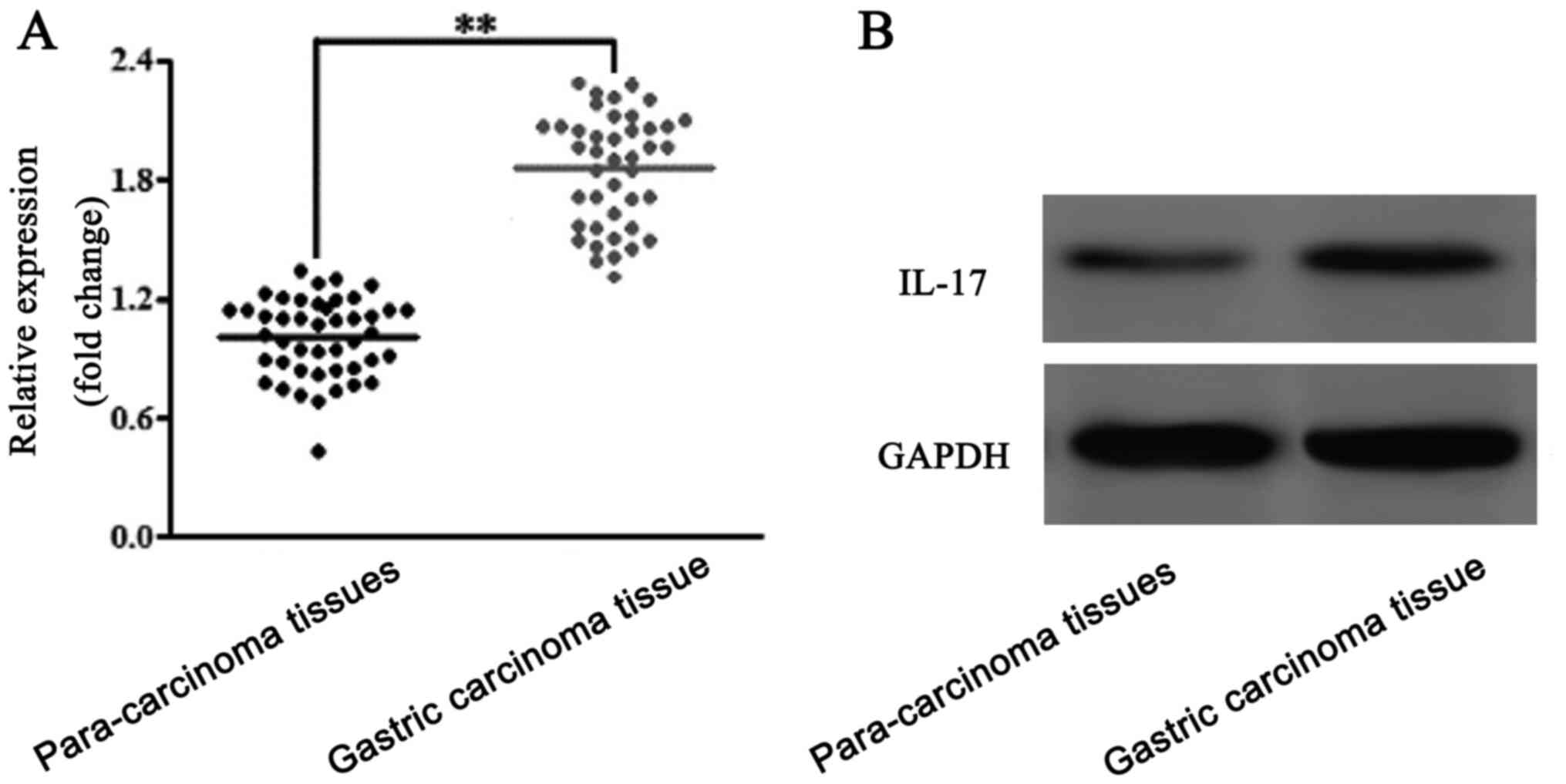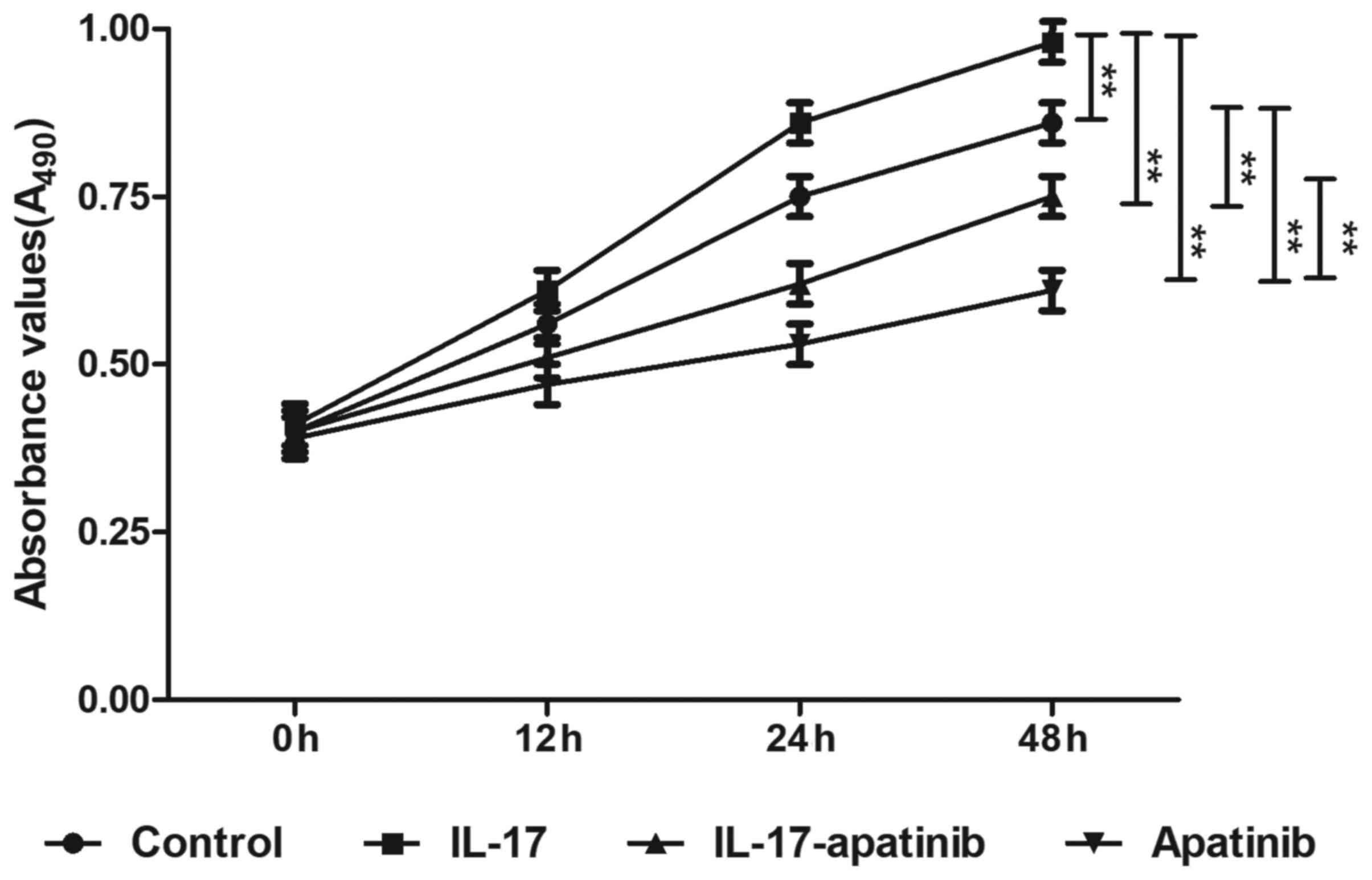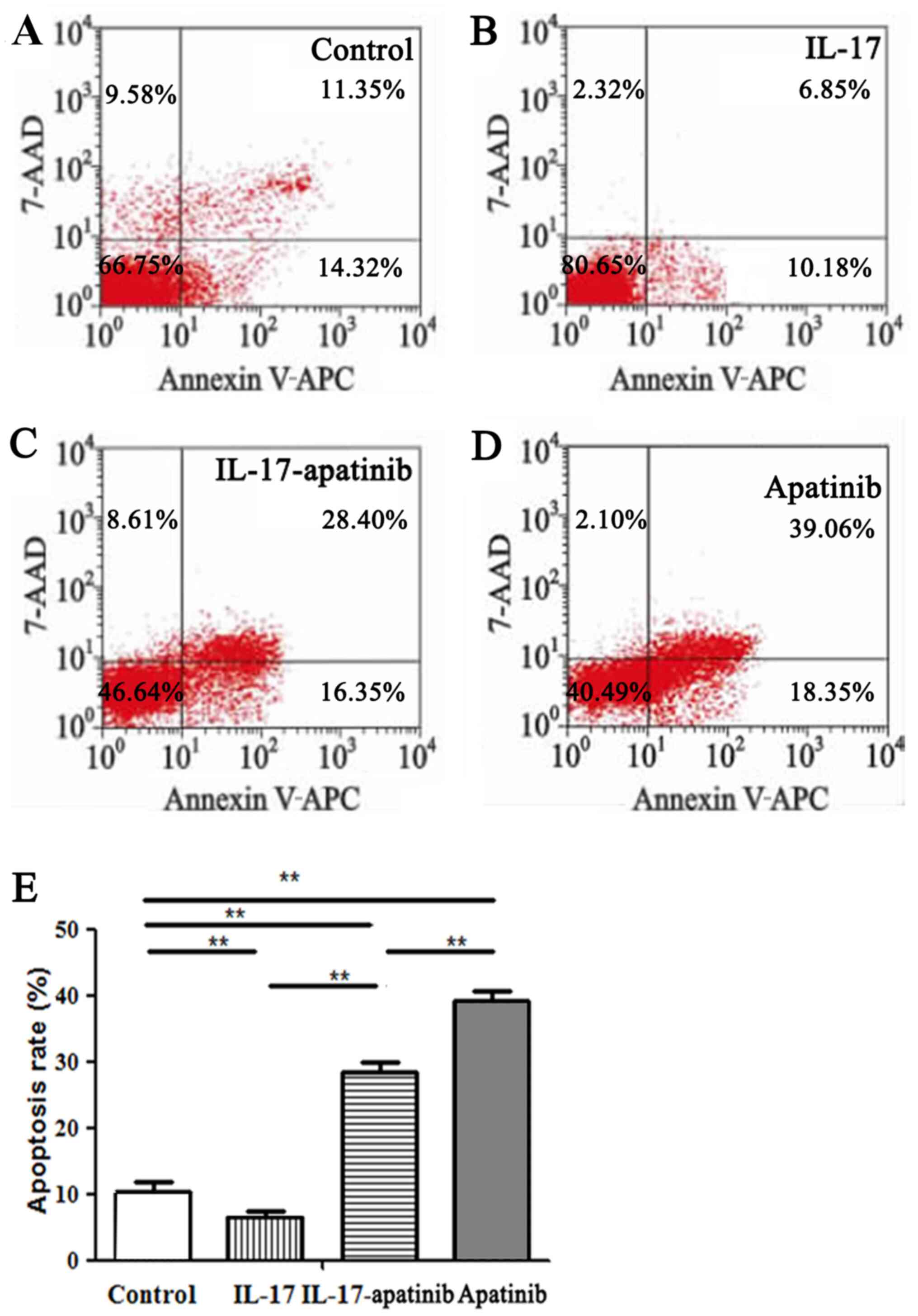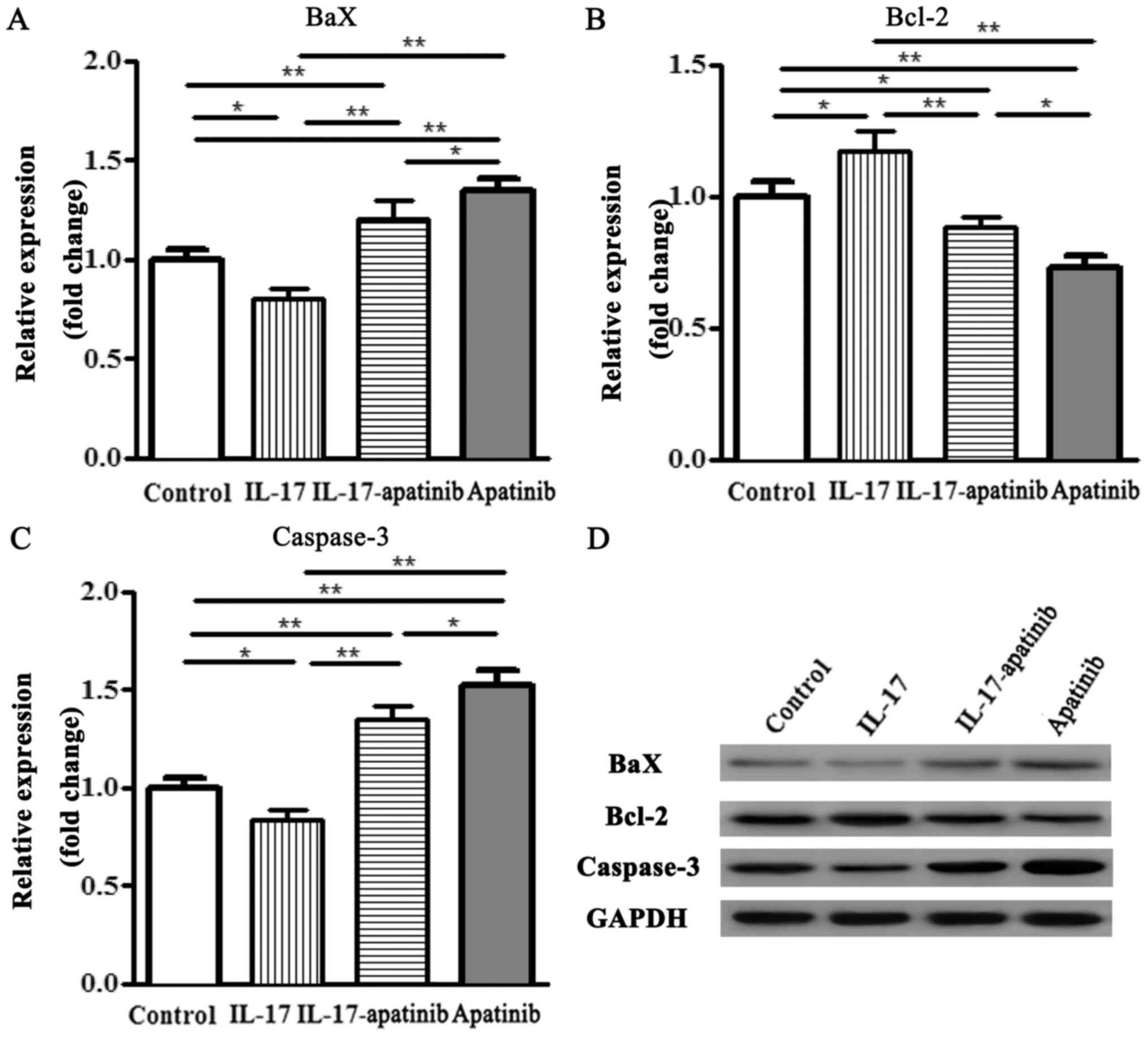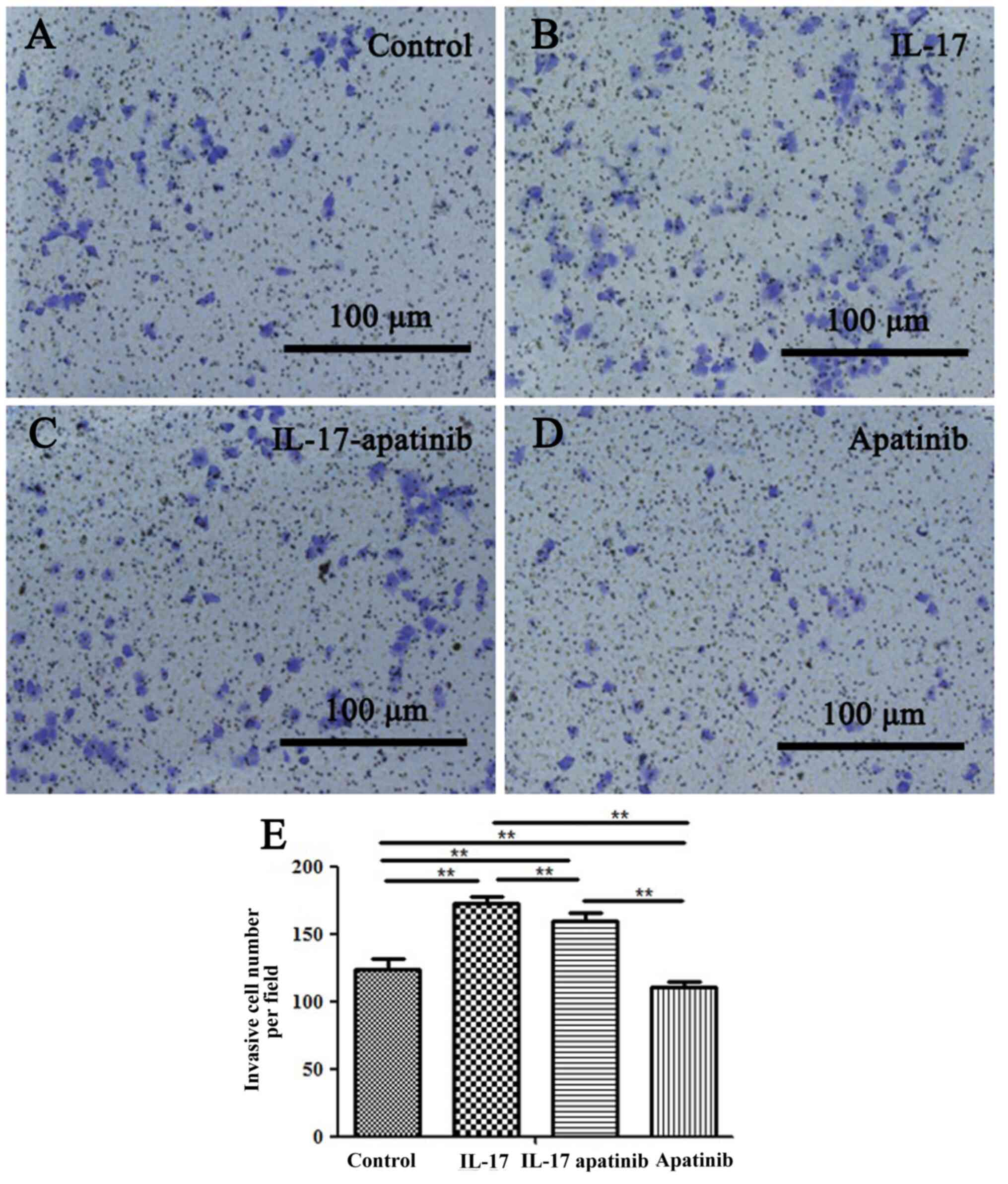|
1
|
Zuo CH, Xie H, Liu J, Qiu XX, Lin JG, Hua
X and Qin A: Characterization of lymph node metastasis and its
clinical significance in the surgical treatment of gastric cancer.
Mol Clin Oncol. 2:821–826. 2014.PubMed/NCBI View Article : Google Scholar
|
|
2
|
Flores-Luna L, Bravo MM, Kasamatsu E,
Lazcano Ponce EC, Martinez T, Torres J, Camorlinga-Ponce M and Kato
I: Risk factors for gastric precancerous and cancers lesions in
Latin American counties with difference gastric cancer risk. Cancer
Epidemiol. 64:101630–101637. 2020.PubMed/NCBI View Article : Google Scholar
|
|
3
|
Katai H, Mizusawa J, Katayama H, Morita S,
Yamada T, Bando E, Ito S, Takagi M, Takagane A, Teshima S, et al:
Survival outcomes after laparoscopy-assisted distal gastrectomy
versus open distal gastrectomy with nodal dissection for clinical
stage IA or IB gastric cancer (JCOG0912): A multicentre,
non-inferiority, phase 3 randomised controlled trial. Lancet
Gastroenterol Hepatol. 5:142–151. 2020.PubMed/NCBI View Article : Google Scholar
|
|
4
|
Li F, Chen Z, Tan B, Liu Y, Zhao Q, Fan L,
Deng H, Ma Y and Li Y: Influential factors and prognostic analysis
of blood vessel invasion in advanced gastric cancer. Pathol Res
Pract. 216:152727–152732. 2020.PubMed/NCBI View Article : Google Scholar
|
|
5
|
Kanat O, O'Neil B and Shahda S: Targeted
therapy for advanced gastric cancer: A review of current status and
future prospects. World J Gastrointest Oncol. 7:401–410.
2015.PubMed/NCBI View Article : Google Scholar
|
|
6
|
Yusefi AR, Bagheri Lankarani K, Bastani P,
Radinmanesh M and Kavosi Z: Risk Factors for Gastric Cancer: A
Systematic Review. Asian Pac J Cancer Prev. 19:591–603.
2018.PubMed/NCBI View Article : Google Scholar
|
|
7
|
Behnampour N, Hajizadeh E, Zayeri F and
Semnani S: Modeling of influential predictors of gastric cancer
incidence rates in Golestan province, North Iran. Asian Pac J
Cancer Prev. 15:1111–1117. 2014.PubMed/NCBI View Article : Google Scholar
|
|
8
|
Pan W, Zhang H, Wang L, Zhu T, Chen B and
Fan J: Association between Helicobacter pylori infection and kidney
damage in patients with peptic ulcer. Ren Fail. 41:1028–1034.
2019.PubMed/NCBI View Article : Google Scholar
|
|
9
|
Sánchez Rodríguez E, Sánchez Aldehuelo R,
Ríos León R, Martín Mateos RM, García García de Paredes A, Martín
de Argila C, Caminoa A, Albillos A and Vázquez-Sequeiros E:
Clinical validation of Endofaster® for a rapid diagnosis
of Helicobacter pylori infection. Rev Esp Enferm Dig. 112:23–26.
2020.PubMed/NCBI View Article : Google Scholar
|
|
10
|
Liao C, Hu S, Zheng Z and Tong H:
Contribution of interaction between genetic variants of
interleukin-11 and Helicobacter pylori infection to the
susceptibility of gastric cancer. OncoTargets Ther. 12:7459–7466.
2019.PubMed/NCBI View Article : Google Scholar
|
|
11
|
Simondurairaj C, Krishnakumar R, Sundaram
S and Venkatraman G: Interleukin-6 receptor (IL-6R) expression in
human gastric carcinoma and its clinical dignificance. Cancer
Invest. 37:293–298. 2019.PubMed/NCBI View Article : Google Scholar
|
|
12
|
Zhang Y, Tang M, Wang XG, Gu JH, Zhou LN,
Jin J, Li P, Wang LQ and Chen MB: Elevated serum levels of
interleukin-37 correlate with poor prognosis in gastric cancer. Rev
Esp Enferm Dig. 111:941–945. 2019.PubMed/NCBI View Article : Google Scholar
|
|
13
|
Liu Q, Zhang Y, Zhang J, Tao K, Hambly BD
and Bao S: Inverse correlation between Interleukin-34 and gastric
cancer, a potential biomarker for prognosis. Cell Biosci.
10(94)2020.PubMed/NCBI View Article : Google Scholar
|
|
14
|
Liu Y, Xu Y, Wang Y, Yao Y and Yang J:
Associations between interleukin gene polymorphisms and the risk of
gastric cancer: A meta-analysis. Clin Exp Pharmacol Physiol.
45:1236–1244. 2018.PubMed/NCBI View Article : Google Scholar
|
|
15
|
Bao S, Hu R and Hambly BD: IL-34, IL-36
and IL-38 in colorectal cancer-key immunoregulators of
carcinogenesis. Biophys Rev. 12:925–930. 2020.PubMed/NCBI View Article : Google Scholar
|
|
16
|
Elshazli RM, Salman DO, Kamel MM, Toraih
EA and Fawzy MS: Genetic polymorphisms of IL-17A rs2275913,
rs3748067 and IL-17F rs763780 in gastric cancer risk: Evidence from
8124 cases and 9873 controls. Mol Biol Rep. 45:1421–1444.
2018.PubMed/NCBI View Article : Google Scholar
|
|
17
|
Li S, Cong X, Gao H, Lan X, Li Z, Wang W,
Song S, Wang Y, Li C, Zhang H, et al: Tumor-associated neutrophils
induce EMT by IL-17a to promote migration and invasion in gastric
cancer cells. J Exp Clin Cancer Res. 38:6–18. 2019.PubMed/NCBI View Article : Google Scholar
|
|
18
|
Zhao WM, Shayimu P, Liu L, Fang F and
Huang XL: Association between IL-17A and IL-17F gene polymorphisms
and risk of gastric cancer in a Chinese population. Genet Mol Res.
15:1–7. 2016.PubMed/NCBI View Article : Google Scholar
|
|
19
|
Wu D, Wu P, Huang Q, Liu Y, Ye J and Huang
J: Interleukin-17: A promoter in colorectal cancer progression.
Clin Dev Immunol. 2013:436307–436313. 2013.PubMed/NCBI View Article : Google Scholar
|
|
20
|
Meng XY, Zhou CH, Ma J, Jiang C and Ji P:
Expression of interleukin-17 and its clinical significance in
gastric cancer patients. Med Oncol. 29:3024–3028. 2012.PubMed/NCBI View Article : Google Scholar
|
|
21
|
Yang L, Qi Y, Hu J, Tang L, Zhao S and
Shan B: Expression of Th17 cells in breast cancer tissue and its
association with clinical parameters. Cell Biochem Biophys.
62:153–159. 2012.PubMed/NCBI View Article : Google Scholar
|
|
22
|
Wang FH, Shen L, Li J, Zhou ZW, Liang H,
Zhang XT, Tang L, Xin Y, Jin J, Zhang YJ, et al: The Chinese
Society of Clinical Oncology (CSCO): Clinical guidelines for the
diagnosis and treatment of gastric cancer. Cancer Commun (Lond).
39:10–40. 2019.PubMed/NCBI View Article : Google Scholar
|
|
23
|
Batista TP, Santos CA and Almeida GFG:
Perioperative chemotherapy in locally advanced gastric cancer. Arq
Gastroenterol. 50:236–242. 2013.PubMed/NCBI View Article : Google Scholar
|
|
24
|
Hammoud MK, Yosef HK, Lechtonen T,
Aljakouch K, Schuler M, Alsaidi W, Daho I, Maghnouj A, Hahn S,
El-Mashtoly SF, et al: Raman micro-spectroscopy monitors acquired
resistance to targeted cancer therapy at the cellular level. Sci
Rep. 8:15278–15288. 2018.PubMed/NCBI View Article : Google Scholar
|
|
25
|
Bing K, Ming K and Yuan G: Efficacy and
safety of mono chemotherapy and targeted therapy for advanced non
small cell lung cancer patients over 80 years old. J Chengdu Med
Coll. 13:473–476. 2018.(In Chinese).
|
|
26
|
Lin Y, Zhai E, Liao B, Xu L, Zhang X, Peng
S, He Y, Cai S, Zeng Z and Chen M: Autocrine VEGF signaling
promotes cell proliferation through a PLC-dependent pathway and
modulates Apatinib treatment efficacy in gastric cancer.
Oncotarget. 8:11990–12002. 2017.PubMed/NCBI View Article : Google Scholar
|
|
27
|
Chen R, Chen QT and Dong YH: Clinical
efficacy of apatinib in treating metastatic gastric cancer and its
effect on IL-17. Oncol Lett. 17:5447–5452. 2019.PubMed/NCBI View Article : Google Scholar
|
|
28
|
Livak KJ and Schmittgen TD: Analysis of
relative gene expression data using real-time quantitative PCR and
the 2(-ΔΔ C(T)) method. Methods. 25:402–408. 2001.PubMed/NCBI View Article : Google Scholar
|
|
29
|
Okada K, Fujimura T, Kikuchi T, Aino M,
Kamiya Y, Izawa A, Iwamura Y, Goto H, Okabe I, Miyake E, et al:
Effect of interleukin (IL)-35 on IL-17 expression and production by
human CD4+ T cells. PeerJ. 5(e2999)2017.PubMed/NCBI View Article : Google Scholar
|
|
30
|
Perdomo-Celis F, Feria MG, Taborda NA and
Rugeles MT: A Low Frequency of il 17 producing CD8 (+) T Cells is
associated with persistent immune activation in people living with
HIV despite HAART induced viral suppression. Front Immunol.
9:2502–2515. 2018.PubMed/NCBI View Article : Google Scholar
|
|
31
|
Volarić I, Vičić M and Prpić-Massari L:
The Role of CD8+ T cells and their cytokines in the pathogenesis of
psoriasis. Acta Dermatovenerol Croat. 27:159–162. 2019.PubMed/NCBI
|
|
32
|
Wu X, Zeng Z, Xu L, Yu J, Cao Q, Chen M,
Sung JJ and Hu P: Increased expression of IL17A in human gastric
cancer and its potential roles in gastric carcinogenesis. Tumour
Biol. 35:5347–5356. 2014.PubMed/NCBI View Article : Google Scholar
|
|
33
|
Iida T, Iwahashi M, Katsuda M, Ishida K,
Nakamori M, Nakamura M, Naka T, Ojima T, Ueda K, Hayata K, et al:
Prognostic significance of IL-17 mRNA expression in peritoneal
lavage in gastric cancer patients who underwent curative resection.
Oncol Rep. 31:605–612. 2014.PubMed/NCBI View Article : Google Scholar
|
|
34
|
Surendar J, Frohberger SJ, Karunakaran I,
Schmitt V, Stamminger W, Neumann AL, Wilhelm C, Hoerauf A and
Hübner MP: Adiponectin limits IFN-γ and IL-17 producing CD4 T cells
in obesity by restraining cell intrinsic glycolysis. Front Immunol.
10:2555–2571. 2019.PubMed/NCBI View Article : Google Scholar
|
|
35
|
Xu LZ, Xie RD, Xie H, Ju JY, Fu XY, Di DL,
Peng MY, Gao W, Zhang YY, Yu D, et al: Chimeric specific antigen
epitope-carrying dendritic cells induce interleukin-17(+)
regulatory T cells to suppress food allergy. Clin Exp Allergy.
50:231–243. 2020.PubMed/NCBI View Article : Google Scholar
|
|
36
|
Deng M, Zha J, Jiang Z, Jia X, Shi Y, Li
P, Chen XL, Fang Z, Du Z and Xu B: Apatinib exhibits anti-leukemia
activity in preclinical models of acute lymphoblastic leukemia. J
Transl Med. 16:47–56. 2018.PubMed/NCBI View Article : Google Scholar
|
|
37
|
Wang W, Zhang L, Xie Y, Zhen T, Su G and
Zang Q: Fatal hemoptysis in patients with advanced esophageal
cancer treated with apatinib. OncoTargets Ther. 11:2565–2570.
2018.PubMed/NCBI View Article : Google Scholar
|
|
38
|
Peng H, Zhang Q, Li J, Zhang N, Hua Y, Xu
L, Deng Y, Lai J, Peng Z, Peng B, et al: Apatinib inhibits VEGF
signaling and promotes apoptosis in intrahepatic
cholangiocarcinoma. Oncotarget. 7:17220–17229. 2016.PubMed/NCBI View Article : Google Scholar
|
|
39
|
Wu X and Huang S: HER2-specific chimeric
antigen receptor-engineered natural killer cells combined with
apatinib for the treatment of gastric cancer. Bull Cancer.
106:946–958. 2019.PubMed/NCBI View Article : Google Scholar
|
|
40
|
Xu Z, Hu C, Chen S, Zhang C, Yu J, Wang X,
Lv H and Cheng X: Apatinib enhances chemosensitivity of gastric
cancer to paclitaxel and 5-fluorouracil. Cancer Manag Res.
11:4905–4915. 2019.PubMed/NCBI View Article : Google Scholar
|















